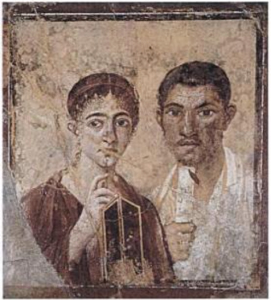by Marianna Thoma
Associated researcher@EVWRIT
Across the centuries, women’s letters offer us direct contact with their thoughts and feelings and illuminate the roles women played within their families, their communities, and the social and political movements of their times. Over time, a large number of women’s correspondences have been made the subject of various publications. For example, women letter writers in early modern Europe created lengthy correspondences, where they expressed their literacy and their creativity (cf. J. M. Ferrante. 1997. To the Glory of Her Sex: Women’s Roles in the Composition oMedieval Texts. Bloomington). Recently I published a monograph in Modern Greek language entitled “Women letter-writers in ancient Greek papyri” (Γυναίκες Επιστολογράφοι στους Αρχαίους Ελληνικούς Παπύρους) which includes an updated list of women’s papyrus letters from the Hellenistic to the Byzantine times with their translation and commentary and could be considered as a supplement to the monograph offered by R. Bagnall and R. Cribiore fifteen years ago (“Women’s Letters from Ancient Egypt, 300 BC-AD 800”, 2006/ 2008 online version).
While studying these letters, I was excited by the immediacy and sense of direct access to the personal lives of people who lived two millennia ago. What is more, women are definitely expressing themselves on their own behalf and not through a male who controls the representation of their thought, contrary to ancient literary texts, in most of which we learn about women through their male authors. Although in many cases, it turns out to be remarkably difficult to be sure who wrote the letters discussed, since a great percentage of women in antiquity were illiterate, we can recognize in these letters the female way of thinking which seems to be common to women of all times.
Women’s papyrus letters provide us with rich information about their everyday experiences, emotions and social attitudes. They give evidence of the women’s active participation in various aspects of everyday life, such as the management of household businesses and legal matters. Their letters also demonstrate women’s everyday influence on their male recipients.

Woman with wax tablets and stylus (so-called “Sappho”)
Household Management
Women letter-writers have a prominent role in family letters exchanged between members of the household who are separated by geographical distance due to various reasons (work, education, marriage etc.). Several wives appear to reassure their husbands about their successful household management in their absence. A characteristic example from 99 A.D. is the detailed report sent by Apollonous to her brother/husband Terentianus in regard with various economic and family issues (P.Mich. VIII 464 = TM17238, https://papyri.info/ddbdp/p.mich;8;464). During his absence, the writer appears to manage the household affairs quite successfully. She conveys him a lot of information and positive news with regard to the productivity of their fields and their children’s education:
“And do not worry about the children; they are in good health, and they are kept busy with a teacher. And about your fields, I have reduced your brother’s rent to the extent of two artabai. Now I receive from him eight artabai of wheat and six artabai of vegetable seed. And do not worry about us and take care of yourself. I understood from Thermouthas that you obtained for yourself a pair of belts, and I was much gratified. And about the olive yards, they are quite productive so far. And the gods willing, if it is possible, come to us.”
Women’s Self-Representation as the “Weak Sex”: Social Reality or Rhetorical Strategy?
Papyrus letters show that women, and mainly wives addressing to their husbands, very frequently give advice, directions or orders on economic and business matters. It is interesting that even when female authors admit their sex weakness in their letters, they appear to be powerful enough to affect men’s decisions. An illustrative example is offered by the letter of a dynamic wife to her husband, in which she sends various types of advice and instructions although behaving with modesty (P.Giss. I 79 = TM 19468, 117-118 A.D):
“But if God allows a large yield next season, soon, because of what will be the low price of the produce, the landowners will be discouraged, so that we will be able to buy at a low price, as you wish.” (tr. Bagnall – Cribiore 2006, 162).
The writer even advises her husband to wait for the next season before he buys land. Although she tries to influence her husband, she highlights her weakness due to her sex, aiming at a captatio benevolentiae in order to gain her husband’s attention and comprehension.
“… I could take hold of the management of our property, I would not hesitate, but in any case, as I am a woman, I exercise every care”. (tr. Bagnall – Cribiore 2006, 162).
Applying Emotional Pressure
Besides her advice, a wife can also apply emotional pressure on her husband so that she ensures his help and support. A threat full of disappointment and anxiety is expressed in a letter from the second or third century Oxyrhynchos, written by a certain Isidora to her husband Hermias. The writer is afraid that her sick child is about to die and asks her husband to return home immediately to assist her (PSI III 177 = TM 28065, https://papyri.info/ddbdp/psi;3;177).
“The child is sick. He has lost weight, since he has not eaten for six days. I am afraid that he is going to die in your absence. You should know that if he dies while you are away, you will find me to have hanged myself.”
Her desperate threat of committing suicide reflects her emotional stress and should be considered as an ultimate attempt to persuade her husband to come back home.
A mother’s complaint
Complaining to their recipients for being indifferent towards them and their problems is a common reason for a woman to write a letter. Most complaints attested in women’s letters, mainly by mothers to their sons away from home, stress their poverty and distress. In her letter (BGU III 948 = TM 33251, https://papyri.info/ddbdp/bgu;3;948 ), Kophaëna complains to her son of his neglect, since he has not written even once, although she was sick for thirteen months. She is trying to make him feel embarrassed about his behavior so that her request for various goods be accomplished.
“I want you to know what the steward told you, that “Your mother, your mother, Kophaëna, is ill,” look, for thirteen months and you have not even tried to write me a letter, because you know that I have treated you better than (my other sons?), and you have not tried, hearing that I am ill, you have not tried to send anything to me, not even something short.” (tr. Bagnall – Cribiore 2006, 244).

A wall painting from the house of Terrentius Neo,
entombed during the eruption of Vesuvius in 79 AD.
Settlement of a family dispute
Private letters can contribute to better understand the women’s role in the initiation and the settlement of a family dispute, mainly by manipulating a man’s will. Such a case of a woman’s power on her husband is described in Isidora’s letter to her daughter Sarapias (P.Mich. VIII 514 = TM 30514, https://papyri.info/ddbdp/p.mich;8;514 ) from the third century A.D. Isidora writes to her daughter Sarapias who is in Karanis with her family and Isidora’s husband. Sarapias’s father has caused some family disagreement between the young couple and the woman is planning to visit her daughter in order to restore the marital concordia disrupted by her husband. It is very interesting that Isidora confesses in lines 21-22 “I hear that you have quarreled with your husband on account of your father. He has not stayed with me because it is winter. Send him to his own place; if I go upcountry, I shall manage him again”.
Women letter-writers appear to control various aspects of the everyday life of the household and affect the social dynamics of the family relationships. By sending letters, these women manage to overcome the short or long geographical distances that separate them from their loved ones and to convey their daily thoughts, problems, desires and fears. Despite their leading role in the everyday life of their family, women letter writers do not cease to be aware of their legal and social position and the weakness due to their gender. A mother who complains to her son about his indifference or a wife who tries to manipulate her husband’s will give evidence of women’s stereotypical behaviors over the centuries.
The texts discussed were also presented in the International Conference WIA 2020 “Women Disrupting Patriarchy” (title of the paper: ‘Empowered women in papyrus letters from Greco-Roman Egypt: aspects of women’s influence on their male correspondents’). They can also be found in my recent monograph «Γυναίκες Επιστολογράφοι στους Αρχαίους Ελληνικούς Παπύρους» (Athens 2020, 978-618-84454-6-8).